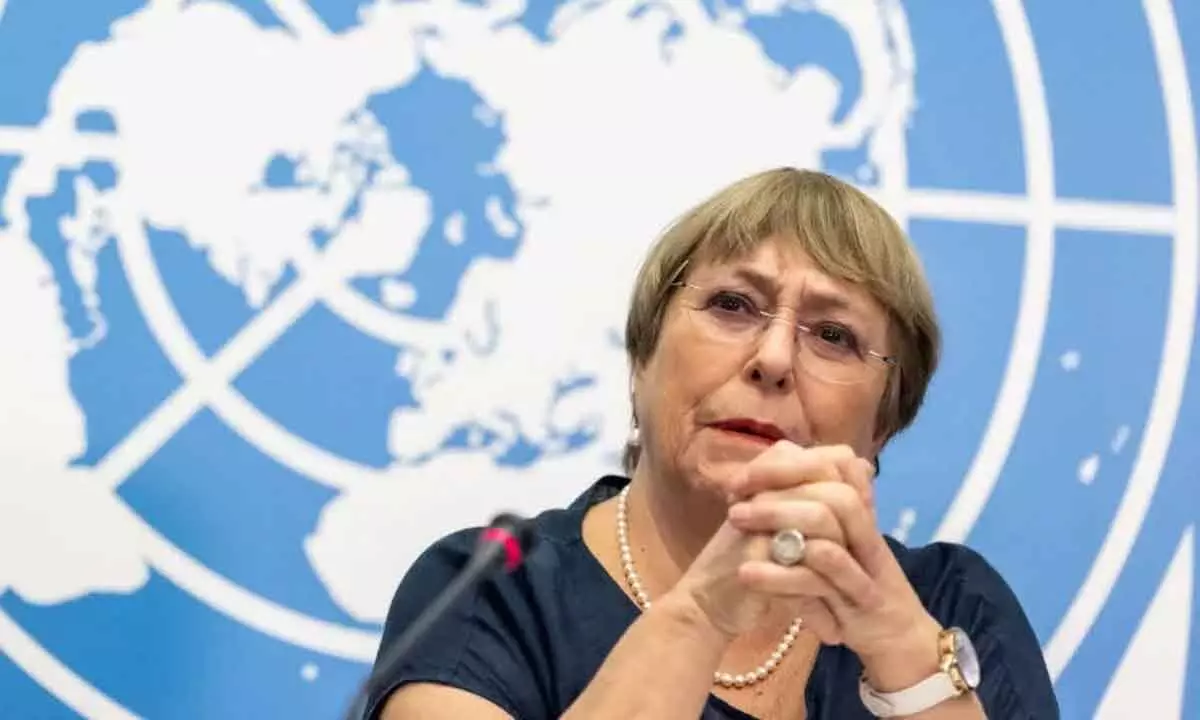Geneva: The United Nations launched a bombshell file into critical human rights abuses in China’s Xinjiang vicinity overdue Wednesday, announcing torture allegations had been credible and bringing up viable crimes in opposition to humanity.
The file, withinside the making for round a 12 months, become launched in Geneva at 11:forty seven pm (2147 GMT) on Wednesday — simply thirteen mins earlier than Michelle Bachelet’s four-12 months time period as UN High Commissioner for Human Rights expired.
The former Chilean president become decided to make certain the file noticed the mild of day — notwithstanding excessive strain from an infuriated Beijing.
“I stated that I might put up it earlier than my mandate ended and I have,” Bachelet stated in an electronic mail despatched to AFP.
“The problems are critical — and I raised them with high-degree countrywide and local government withinside the country.”
China has been accused for years of detaining extra than a million Uyghurs and different Muslim minorities withinside the far-western Xinjiang vicinity.
Campaigners have accused China of a litany of abuses, even as Beijing has vehemently rejected the claims, insisting it’s miles going for walks vocational education centres in Xinjiang designed to counter extremism.
Bachelet in the end determined that a complete evaluation become wished of the scenario withinside the Xinjiang Uyghur Autonomous Region (XUAR).
– Torture allegations ‘credible’ –
“Serious human rights violations had been dedicated in XUAR withinside the context of the government’s utility of counter-terrorism and counter-‘extremism’ strategies,” the file stated.
The evaluation raised worries approximately the remedy of human beings held in China’s so-known as “Vocational Education and Training Centres”.
“Allegations of styles of torture or ill-remedy, which include compelled scientific remedy and unfavourable situations of detention, are credible, as are allegations of person incidents of sexual and gender-primarily based totally violence,” the file stated.
“The quantity of arbitrary and discriminatory detention of participants of Uyghur and different predominantly Muslim groups, pursuant to regulation and policy, in context of regulations and deprivation extra normally of essential rights loved in my view and collectively, might also additionally represent worldwide crimes, mainly crimes in opposition to humanity,” it added.
The file entreated Beijing, the UN and the arena at big to awareness its gaze at the scenario defined in Xinjiang.
“The human rights scenario in XUAR additionally calls for pressing interest via way of means of the government, the United Nations intergovernmental our bodies and human rights system, in addition to the worldwide network extra broadly,” it stated.
The 49-web page file made no connection with genocide: one of the key allegations made via way of means of China’s critics, which include the USA and lawmakers in different Western countries.
– ‘Firmly opposed’ –
Speaking on Wednesday after Bachelet’s workplace had introduced it’d launch the file, Zhang Jun, China’s ambassador to the UN in New York, stated Beijing had instructed her that it become “firmly opposed” to the rights evaluation.
“The so-known as Xinjiang problem is a totally fabricated lie out of political motivations and its reason is in reality to undermine China’s balance and to hinder China’s development,” Zhang instructed reporters.
He stated Bachelet must have stayed “independent” and now no longer caved in to “political strain” from Western countries.
Bachelet and her workplace have again and again defined that one purpose the file become not on time become as it were despatched to Beijing first for comments, as is not unusualplace with such reports.
Zhang but maintained that China had now no longer visible the file, and become “absolutely opposed” to it.
“It honestly undermines the cooperation among the UN and a member state. It absolutely interferes in China’s inner affairs,” he stated.
Bachelet insisted that talk with Beijing did now no longer mean “condoning, overlooking or turning a blind eye”.
But she added: “The politicisation of those critical human rights problems via way of means of a few states did now no longer help. They made the project extra hard, they made the engagement extra hard and that they made the trust-constructing and the capacity to simply have an effect at the floor extra hard.”

